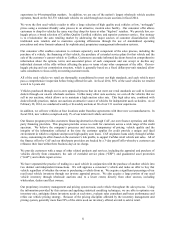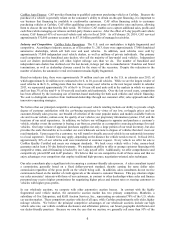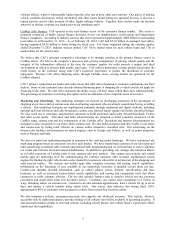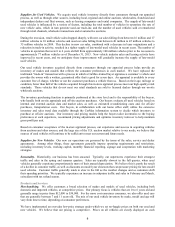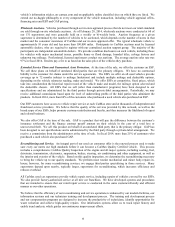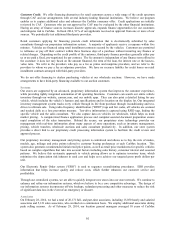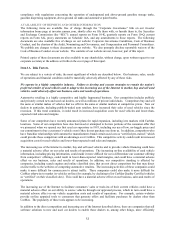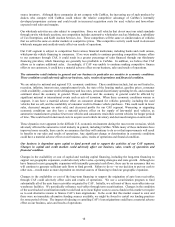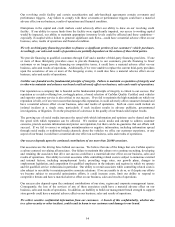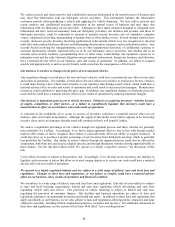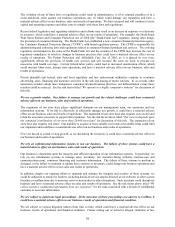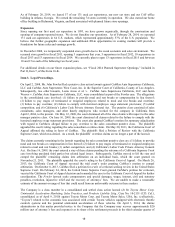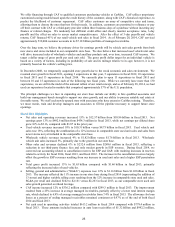CarMax 2014 Annual Report Download - page 19
Download and view the complete annual report
Please find page 19 of the 2014 CarMax annual report below. You can navigate through the pages in the report by either clicking on the pages listed below, or by using the keyword search tool below to find specific information within the annual report. 15
We collect, process and retain sensitive and confidential customer information in the normal course of business and
may share that information with our third-party service providers. This information includes the information
customers provide when purchasing a vehicle and applying for vehicle financing. We also collect, process and
retain sensitive and confidential associate information in the normal course of business and may share that
information with our third-party service providers. Although we have taken measures designed to safeguard such
information and have received assurances from our third-party providers, our facilities and systems, and those of
third-party providers, could be vulnerable to external or internal security breaches, acts of vandalism, computer
viruses, misplaced or lost data, programming or human errors or other similar events. Several national retailers have
recently disclosed security breaches involving sophisticated cyber-attacks which were not recognized or detected
until after such retailers had been affected, notwithstanding the preventive measures such retailers had in place. Any
security breach involving the misappropriation, loss or other unauthorized disclosure of confidential customer or
associate information, whether experienced by us or by our third-party service providers, and whether due to an
external cyber-security incident, a programming error, or other cause, could damage our reputation, expose us to
mitigation costs and the risks of private litigation and government enforcement, disrupt our business, and otherwise
have a material adverse effect on our business, sales and results of operations. In addition, our failure to respond
quickly and appropriately to such a security breach could exacerbate the consequences of the breach.
Our business is sensitive to changes in the prices of new and used vehicles.
Any significant changes in retail prices for new and used vehicles could have a material adverse effect on our sales
and results of operations. For example, if retail prices for used vehicles rise relative to retail prices for new vehicles,
it could make buying a new vehicle more attractive to our customers than buying a used vehicle, which could have a
material adverse effect on sales and results of operations and could result in decreased used margins. Manufacturer
incentives could contribute to narrowing this price gap. In addition, any significant changes in wholesale prices for
used vehicles could have a material adverse effect on our results of operations by reducing wholesale margins.
Our business is dependent upon access to vehicle inventory. Obstacles to acquiring inventory—whether because
of supply, competition, or other factors—or a failure to expeditiously liquidate that inventory could have a
material adverse effect on our business, sales and results of operations.
A reduction in the availability of or access to sources of inventory could have a material adverse effect on our
business, sales and results of operations. Although the supply of late-model used vehicles appears to be increasing
recently, there can be no assurance that this trend will continue or that it will benefit CarMax.
We source a significant percentage of our vehicles though our appraisal process and these vehicles are generally
more profitable for CarMax. Accordingly, if we fail to adjust appraisal offers to stay in line with broader market
trade-in offer trends, or fail to recognize those trends, it could adversely affect our ability to acquire inventory. It
could also force us to purchase a greater percentage of our inventory from third-party auctions, which is generally
less profitable for CarMax. Our ability to source vehicles through our appraisal process could also be affected by
competition, both from new and used car dealers directly and through third-party websites driving appraisal traffic to
those dealers. See the risk factor above titled “We operate in a highly competitive industry” for discussion of this
risk.
Used vehicle inventory is subject to depreciation risk. Accordingly, if we develop excess inventory, the inability to
liquidate such inventory at prices that allow us to meet margin targets or to recover our costs could have a material
adverse effect on our results of operations.
We operate in a highly regulated industry and are subject to a wide range of federal, state and local laws and
regulations. Changes in these laws and regulations, or our failure to comply, could have a material adverse
effect on our business, sales, results of operations and financial condition.
We are subject to a wide range of federal, state and local laws and regulations. Our sale of used vehicles is subject
to state and local licensing requirements, federal and state laws regulating vehicle advertising, and state laws
regulating vehicle sales and service. Our provision of vehicle financing is subject to federal and state laws
regulating the provision of consumer finance. Our facilities and business operations are subject to laws and
regulations relating to environmental protection and health and safety. In addition to these laws and regulations that
apply specifically to our business, we are also subject to laws and regulations affecting public companies and large
employers generally, including federal employment practices, securities and tax laws. For additional discussion of
these laws and regulations, see the section of this Form 10-K titled “Laws and Regulations.”


